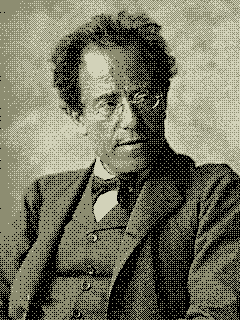Gustav Mahler

Gustav Mahler, now more known as a composer, was one of the leading Austrian conductors in his day (July 7, 1860 – May 18, 1911).
As a composer, he acted as a bridge between the 19th century Austro-German tradition and the modernism of the early 20th century. While in his lifetime his status as a conductor was established beyond question, his own music gained wide popularity only after periods of relative neglect which included a ban on its performance in much of Europe during the Nazi Germany era.
After 1945 the music was discovered and championed by a new generation of listeners; Mahler then became one of the most frequently performed and recorded of all composers, a position he has sustained into the 21st century.
Mahler displayed musical gifts at an early age. After graduating from the Vienna Conservatory in 1878, he held a succession of conducting posts of rising importance in the opera houses of Europe, leading to his appointment in 1897 as director of the "Vienna Court Opera".
Nevertheless, his innovative productions and insistence on the highest standards ensured his reputation as one of the greatest opera conductors, particularly as an interpreter of the stage works of Wagner and Mozart. Late in his life he was briefly director of New York's Metropolitan Opera and the New York Philharmonic.
Mahler's oeuvre is relatively small for much of his life composing was a part-time activity, secondary to conducting and is confined to the genres of symphony and song, except for one early piano quartet. Most of his ten symphonies are very large-scale works, several of which employ soloists and choirs in addition to augmented orchestral forces.
- ~ ~ ~ -
Biography
Born into a Jewish family in Kaliste, Bohemia, his parents moved to Jihlava, Moravia in the first year of his life, where Mahler spent his childhood.
In 1875 he was admitted to the Vienna Conservatoire where he studied piano under Julius Epstein; subsequently, attended lectures given by Anton Bruckner at the university.
His first major attempt at composition came with Das Klagende Lied which he entered in a competition as an opera (he later turned it into a cantata). However, he was unsuccessful and turned his attention to conducting.
After his first conducting job at Bad Hall, he took posts at a succession of increasingly larger opera houses; Ljubljana - 1881, Olomouc - 1882, Kassel - 1884, Prague - 1885, Leipzig - 1886 and Budapest - 1891. He then secured his first long-term post at the Hamburg Opera in 1891, where he stayed until 1897. There, he took his summer vacations at Steinbach-am-Attersee, during which he concentrated on composition. He completed his Symphony No. 1 and the Lieder aus 'Des Knaben Wunderhorn' in this period.
In 1897, Mahler converted from Judaism to Catholicism in order to secure post as artistic director of the prestigious Vienna Court Opera (Jews were virtually prohibited from holding the post at that time). For the next ten years he stayed at Vienna, where he was noted as a great perfectionist.
He ran the Opera for nine months of the year, spending the other three composing, mainly at Maiernigg, where he had a small house on the Wörthersee. There he composed his symphonies 4 through 8, as well as the 5 Rückert-Lieder, the Kindertotenlieder and his last song from texts in Des Knaben Wunderhorn entitled 'Der Tambourg'sell'.
He married Alma Schindler (1879–1964) in 1902. They had two daughters, Anna (1904–1988) who later became a sculptor, and Maria Anna (1902–1907) who died of scarlet fever or diphtheria in 1907. In the same year he discovered he had heart disease (infective endocarditis), and he lost his job at Vienna.
Hounded out by a largely anti-semitic press after trying to promote his own music, which was not well received on the whole. It not until the performance of his Symphony No. 8 in 1910 did Mahler have a true public success with his music. The pieces he wrote after that were not performed in his lifetime.
Mahler was coming under increasingly virulent anti-semitic attacks when he received an offer to conduct Metropolitan Opera in New York. He conducted a season there in 1908, only to be set aside in favor of Arturo Toscanini.
Mahler returned to New York the next year to become conductor of the newly formed New York Philharmonic Orchestra. Around this time, he completed Das Lied von der Erde, and the Symphony No. 9, which turned out to be his last completed work. During his last visit to America in February 1911, he fell seriously ill and was taken back to Vienna at his request.
He died there from a streptococcus infection on May 18, 1911 in Vienna, Austro-Hungarian Empire (now Austria), leaving his tenth symphony incomplete. His last word was "Mozart". He is buried in Vienna, in the Grinzinger Cemetery.
- ~ ~ ~ -
Symphonies
Despite being now known as a composer, composing music was not Mahler's primary activity for most of his life. That means the number of original work composed by Mahler is small when compared to other well-known composers
His most notorious original works are his ten symphonies, which he wasn't able to complete due to his illness and eventual death. Here is a list of his symphonies in order:
- (1884–1888) (D major) Titan
- (1888–1894) (C minor, ends in Eb major) Resurrection
- (1895–1896) (D minor)
- (1899–1901) (G major ends in E major)
- (1901–1902) (C# minor ends in D major)
- (1903–1904) (A minor) Tragic
- (1904–1905) (E minor ends in C major)
- (1906-????) (Eb major)
- (1909–1910) (D major ends in Db major)
- (1910-????) (F# minor/major) (incomplete)
- ~ ~ ~ -
Symphony No. 5 IV Adagietto [download|pass=milkee]
- ~ ~ ~ -